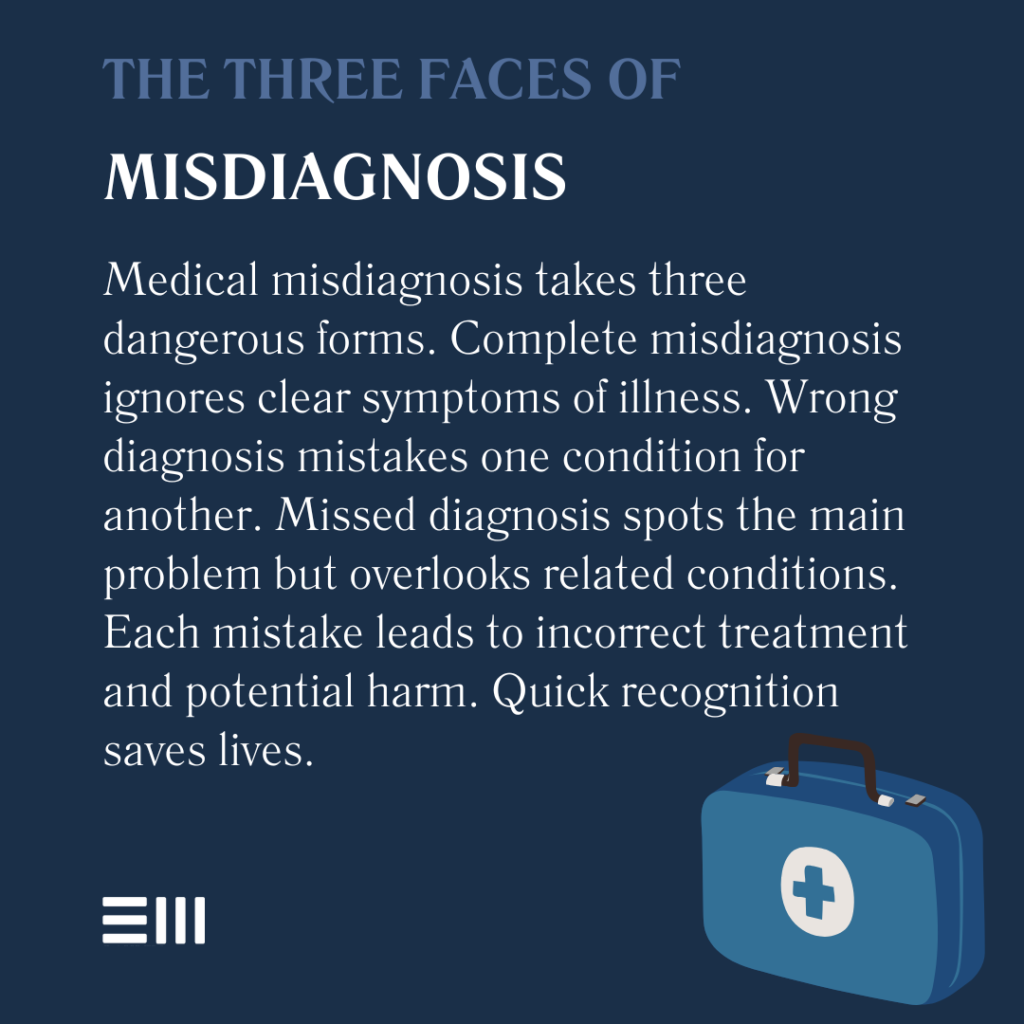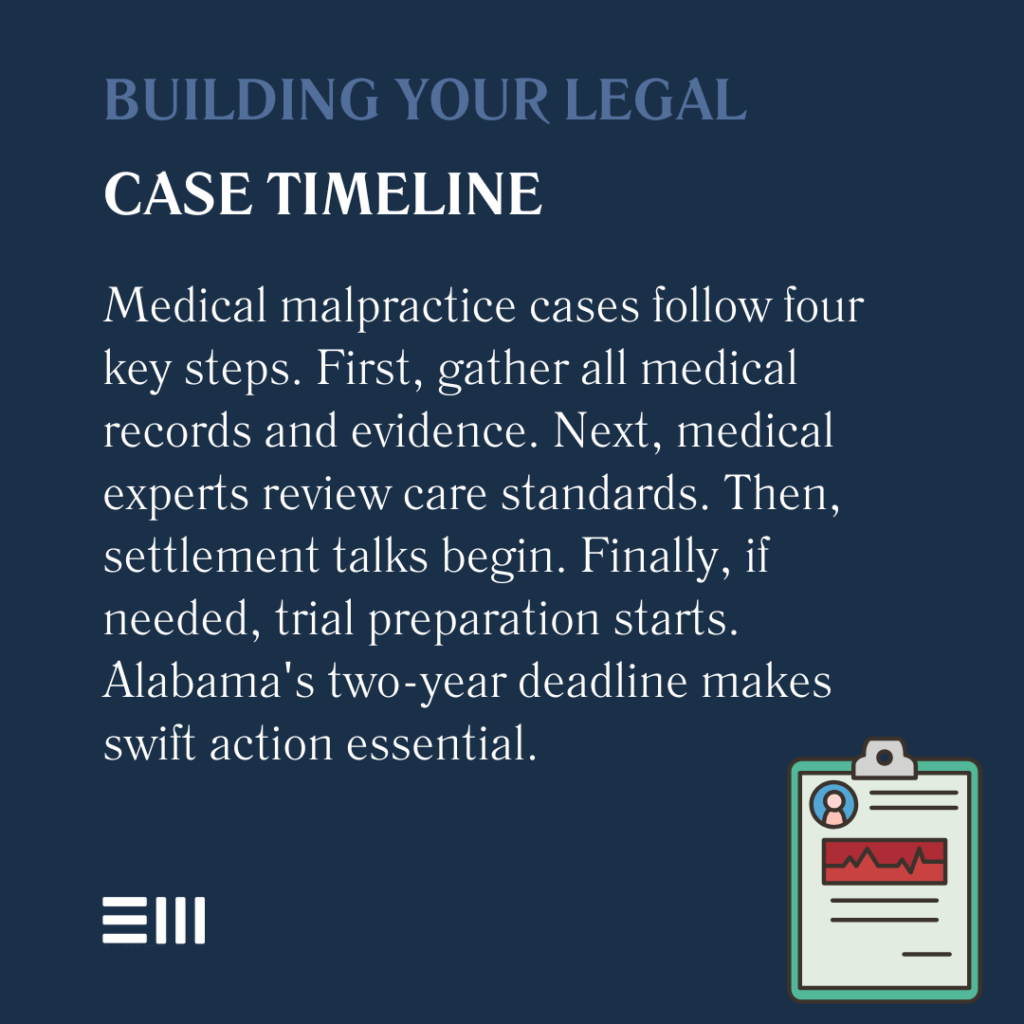
A single misdiagnosis or delayed treatment can forever alter a family’s future.
For Alabama patients who trusted their healthcare providers, the impacts of medical errors extend far beyond the hospital walls, affecting careers, relationships, and entire lives.
Understanding Medical Misdiagnosis and Delayed Treatment
The complex world of medical malpractice begins with understanding how diagnostic errors and treatment delays occur within Alabama’s healthcare system and the profound impact these mistakes have on patient care.
What Constitutes Medical Misdiagnosis?
Healthcare providers can commit diagnostic errors in three primary ways:
- Failing to identify any medical condition despite clear symptoms;
- Diagnosing a condition incorrectly as another illness;
- Missing additional conditions that exist alongside the primary diagnosis;
- Overlooking crucial test results that indicate serious conditions; and
- Dismissing patient symptoms without proper investigation.
Each of these diagnostic errors can set off a chain of incorrect treatments and delayed interventions, compounding the harm to patients over time.
Forms of Delayed Treatment
Treatment delays manifest in various ways throughout the healthcare system:
- Extended waiting periods for necessary medical procedures;
- Failure to expedite urgent medical conditions;
- Delays in specialist referrals and consultations;
- Postponed diagnostic testing and imaging;
- Communication breakdowns between healthcare teams;
- Administrative delays in processing medical orders; and
- Failure to follow up on concerning test results.
These delays, whether caused by system failures or individual oversight, can transform treatable conditions into medical emergencies.
Impact on Patient Outcomes
These medical errors can lead to devastating consequences:
- Disease progression beyond early treatment stages;
- Development of preventable medical complications;
- Need for more aggressive treatment approaches;
- Extended recovery periods and rehabilitation;
- Permanent disability or reduced quality of life;
- Emotional trauma and psychological distress; and
- Financial hardship from additional medical expenses.
Understanding these fundamental aspects of medical malpractice helps patients recognize when their care has fallen below acceptable standards and empowers them to take appropriate action.
Common Types of Misdiagnosis Cases
In Alabama’s healthcare facilities, certain medical conditions consistently face higher risks of misdiagnosis or delayed treatment, often with severe consequences for patients.
Cancer-Related Cases
Cancer misdiagnosis often occurs in several critical ways:
- Breast masses dismissed as normal tissue changes;
- Lung cancer symptoms attributed to chronic respiratory conditions;
- Colorectal cancer signs confused with digestive disorders;
- Skin cancer overlooked during routine examinations;
- Blood cancers mistaken for common infections;
- Delayed biopsy of suspicious growths; and
- Failure to order appropriate screening tests.
These cancer misdiagnosis patterns demonstrate how critical early detection and proper screening protocols are for patient survival and treatment success.
Cardiovascular Conditions
Heart and blood vessel conditions frequently face diagnostic challenges:
- Heart attack symptoms dismissed as acid reflux;
- Stroke warning signs attributed to migraines;
- Aortic dissection mistaken for back pain;
- Blood clots confused with muscle strains;
- Heart failure signs overlooked in younger patients; and
- Irregular heartbeats dismissed as anxiety.
The misdiagnosis of cardiovascular conditions highlights the importance of thorough evaluation, even when symptoms might seem minor or typical of less serious conditions.
Emergency Medicine Cases
The fast-paced emergency department environment creates unique risks:
- Appendicitis confused with stomach viruses;
- Pulmonary embolism mistaken for panic attacks;
- Sepsis symptoms not recognized early enough;
- Spinal cord injuries overlooked after accidents;
- Heart attacks in young patients misdiagnosed; and
- Stroke symptoms dismissed in younger adults.
These patterns of misdiagnosis across different medical specialties highlight the critical importance of thorough evaluation and proper diagnostic protocols in preventing life-altering medical errors.

Legal Rights Under Alabama Law
Understanding your legal rights as a victim of medical malpractice in Alabama forms the foundation for pursuing justice and fair compensation.
Filing Deadlines and Requirements:
- Two-year standard statute of limitations;
- Special provisions for ongoing treatment cases;
- Extended deadlines for minors and incapacitated individuals;
- Discovery rule exceptions for delayed diagnosis cases; and
- Notice requirements to healthcare providers.
Understanding and adhering to these strict legal deadlines is crucial, as missing them can permanently bar your right to seek compensation for medical negligence.
Compensation Categories
Alabama law recognizes several types of damages:
Economic Damages:
- Current and future medical expenses;
- Lost income and reduced earning capacity;
- Rehabilitation and therapy costs;
- Medical equipment and home modifications;
- Long-term care expenses; and
- Transportation and medical travel costs.
Non-Economic Damages:
- Physical pain and suffering;
- Emotional and psychological trauma;
- Loss of life enjoyment;
- Permanent disability impacts;
- Family relationship effects; and
- Mental anguish and distress.
These legal protections serve as crucial safeguards for patients, ensuring their right to seek appropriate compensation when healthcare providers fail to meet professional standards of care.
Building Your Medical Malpractice Case
Creating a strong medical malpractice case requires careful documentation, expert testimony, and a clear demonstration of how the healthcare provider’s negligence caused harm.
Essential Documentation
Critical evidence to preserve includes:
- Complete medical records from all providers;
- Diagnostic test results and imaging;
- Medication histories and prescriptions;
- Communication records with healthcare teams;
- Personal health journals and symptom logs;
- Photographs of visible symptoms or injuries; and
- Medical bills and related expenses.
This comprehensive documentation creates a clear timeline of events and strengthens your case by providing concrete evidence of medical negligence and its impacts.
Expert Requirements
Alabama cases typically require:
- Medical expert testimony establishing standard of care;
- Specialist opinions in relevant fields;
- Analysis of treatment decisions and alternatives;
- Documentation of proper medical procedures; and
- Evidence of deviation from accepted practices.
A well-documented and expertly supported case provides the strongest foundation for achieving a favorable outcome in medical malpractice litigation.

Common Questions About Medical Malpractice Claims in Alabama
Many patients and families facing medical malpractice situations share similar concerns about the legal process and their rights.
How Long Will My Case Take?
Medical malpractice cases typically progress through several stages, including investigation, expert review, negotiations, and possible trial preparation. While some cases resolve within months, complex cases may take several years to reach conclusion.
What Are the Costs Involved?
Most medical malpractice attorneys work on a contingency fee basis, meaning they receive payment only if they secure compensation for you. Court costs, expert witness fees, and document preparation expenses are typically advanced by the law firm.
Will I Have to Go to Court?
Many cases settle through negotiation without requiring a trial. However, having an attorney prepared for trial often leads to better settlement offers and ensures your case is ready if court becomes necessary.
What If Multiple Providers Were Involved?
Cases involving multiple healthcare providers require careful investigation to determine each party’s role and liability.
Your attorney will help identify all potentially responsible parties and pursue appropriate claims against each.
Understanding these common concerns helps patients make informed decisions about pursuing their medical malpractice claims and setting realistic expectations for the process ahead.
Get Professional Legal Support for Your Case
Every day that passes after a medical error can impact your right to compensation. Our experienced Alabama medical malpractice attorneys are ready to evaluate your case and help protect your rights.
Take the first step toward justice and recovery by reaching out to our dedicated legal team for guidance and support.
Can't find what you're looking for? Search our site below.










